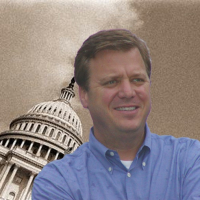Get ready for a train wreck out of Iowa.
Newt Gingrich is starting to lose steam. Brain power alone may not be enough to make it up the hill; attacks are creating too much drag. The former House speaker has peaked, and there’s nowhere to go but down. (With the SEC suing former Fannie Mae and Freddie Mac execs, Gingrich’s purported $1.6 million payday from the mortgage giants may speed his decline.) Politics is all about momentum and timing. You want your curve headed up, not down, as you go into Election Day.
It’s highly likely that Ron Paul will win in Iowa. The caucuses are about passion, and Paul’s hearty band of supporters stick like glue. He is their first, second, and third choice. His ceiling may not ever get very high; his floor will never get very low either.
But the Iowa caucuses are also about organization, organization, organization. While Rep. Paul certainly has passion on his side, the same could be said for Howard Dean in 2004—and Dean came in a distant third on the night that the “Dean Scream” tanked his candidacy. In 2004, the Deaniacs were just as visible on every street corner as the Paulites are in 2011; the one thing Paul has, that Dean didn’t, is a solid get-out-the-vote effort with homegrown Iowa support. A bunch of Deaniac door knockers in goofy orange hats from out of state really didn’t help Dean all that much. Paul’s supporters are essentially from Iowa; they can actually attend their local precinct caucus.
Also, here’s the key with Iowa. While polls may give us a good proportional view of where Iowans stand, polls don’t mean a whole heck of a lot if the candidate has done nothing to get out the vote. It’s one thing to say you’re supporting Newt from the comfort of your toasty living room when Gallup calls; it’s a whole new ballgame when you have to venture out to your local high school on a cold snowy January evening to spend three hours doing nothing more than standing around waiting for the next vote to be called.
Barack Obama didn’t win the Democratic Iowa caucus in 2008 because he was an incredibly magnetic candidate, who, by the sheer force of his personality, made people gravitate to their precinct caucus. No, not by a long shot. Obama won because his supporters knocked on the respective doors of every Iowa Democratic Party member at least three times. Nobody goes to their caucus unless they have been dragged, kicking and screaming, by a well-oiled campaign GOTV effort. Something a notable few candidates don’t understand this cycle.
Despite the fact that Newt is leading in the polls nationally, his GOTV efforts are non-existent in Iowa. Mitt Romney is a late-comer to the game, opening his headquarters just three weeks ago. Rick Perry managed to irk the party establishment in Iowa by announcing his candidacy on the day of the Iowa straw poll; though he is blanketing the state with media, his ground organization is lacking. The only candidates who have mounted serious efforts to get out the vote are Paul, Michele Bachmann and Rick Santorum.

It’s likely the end result is going to fall somewhere between the general level of support by the candidates as reflected in the polls, and the GOTV efforts by each respective campaign. So Paul may win, but if he does, it won’t be decisive.
It’s not a stretch to imagine a five-way finish in Iowa, with Romney, Gingrich, Paul, Perry, Bachmann, and maybe even Santorum, all finishing with between 10 and 20 percent. Though Iowa propelled a little-known peanut farmer to the presidency, it also gave us President Dick Gephardt, President Pat Buchanan and President Mike Huckabee.
Therefore, the verdict is likely to be muddled coming out of Iowa. So, then it’s on to New Hampshire. And we could see a scenario there where Romney, Gingrich, and Jon Huntsman all finish with around 25 percent, although this could be where Huntsman catches fire. But still, it’s more muddle.
So, on to South Carolina, where Gingrich is strong, and Perry’s message is a natural fit. But Romney was just endorsed by the state’s governor, Nikki Haley. So, potentially more muddle. Next is Florida, where Newt is strong but likely to fade, and where Romney will have a solid base. Romney will win Michigan, but as a favorite son of a former governor, he won’t get much juice out of it. So still, the primary muddles on.
With proportional representation (meaning that unlike previous elections where if a candidate won a state he’d win all the delegates, now the pre-Super Tuesday states’ candidates are awarded delegates based on their percentage of the vote), there is every reason for “second-tier” candidates to keep chugging along as accumulated delegates are strong political chips that may be played down the line.
In the end, the Iowa roundhouse may only delay the real train wreck to come.






